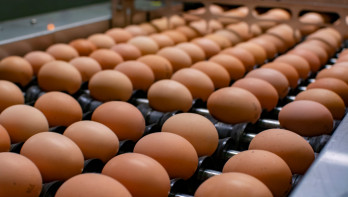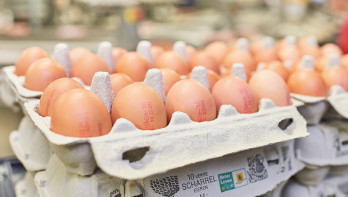Analysis Feature
Egg price takes a significant step back in the new year
The egg price has taken a significant step down with the start of the new year. The demand for confectionery has dropped significantly, which, as is usual at this time of year, leads to lower demand. Meanwhile, the German egg price has dropped below the Dutch level again.
The price of eggs has taken a considerable step down with the arrival of the new year. The price of 100 brown eggs size M decreased from €14.90 to €14.25 in the last two weeks.
The lower egg price is not unexpected. In the new year, egg prices usually take a step back. Demand generally peaks during the holidays. During this period, consumer demand is high because Christmas is associated with more luxurious breakfasts and brunches. Industrial demand also increases during this period as more confectionery is consumed. In the new year, the consumption of confectionery generally decreases as consumers take a step back, leading to a decrease in egg demand.
This year is no different. It is heard in the market that the number of orders has clearly decreased. This does not mean that demand has decreased across the board. The number of orders varies significantly per customer. This is also quite normal for this time of year. While some customers continued to make large purchases during the holidays, others chose to stock up in advance and deplete their stocks at the market peak. Where possible, the industry still does this. The expectation is that prices will continue to decline. Companies that have the luxury to wait a bit longer will certainly do so.
However, this luxury is not available to everyone, which is why some companies are actually placing large orders in the new year now that stocks are low and prices have dropped slightly. It is heard in the market that various players are requesting significantly more eggs than usual. This creates some balance, preventing a too steep decline. As a rule, this results in a further decrease in prices in the weeks after the turn of the year, as these backlog orders are corrected during this phase.
German egg price drops more sharply
Meanwhile, the German egg price has dropped even more sharply. The Weser-Ems quotation ended the holidays with an even steeper decline. In week 51, brown eggs size M were traded for €15.20 per 100 pieces. In week 1, the price was significantly lower at €14.
As a result, eggs in Germany are clearly cheaper than in the Netherlands. Last year, the situation was almost constantly reversed. During that period, the egg price was quite high due to a lack of OKT eggs (Ohne Kükentöten). Since 2022, in-ovo sexing has been mandatory in Germany. However, the market was unable to check enough eggs for gender until well into 2024. This problem has not been an issue since the end of the year. During these holidays, shortages were still feared, but problems did not arise as production has proven to be just sufficient.
There was still a shortage in the market for free-range eggs. These markets are now reasonably balanced, while the supply of barn eggs in Germany is abundant. However, the market for organic eggs is still very tight, it is heard.


